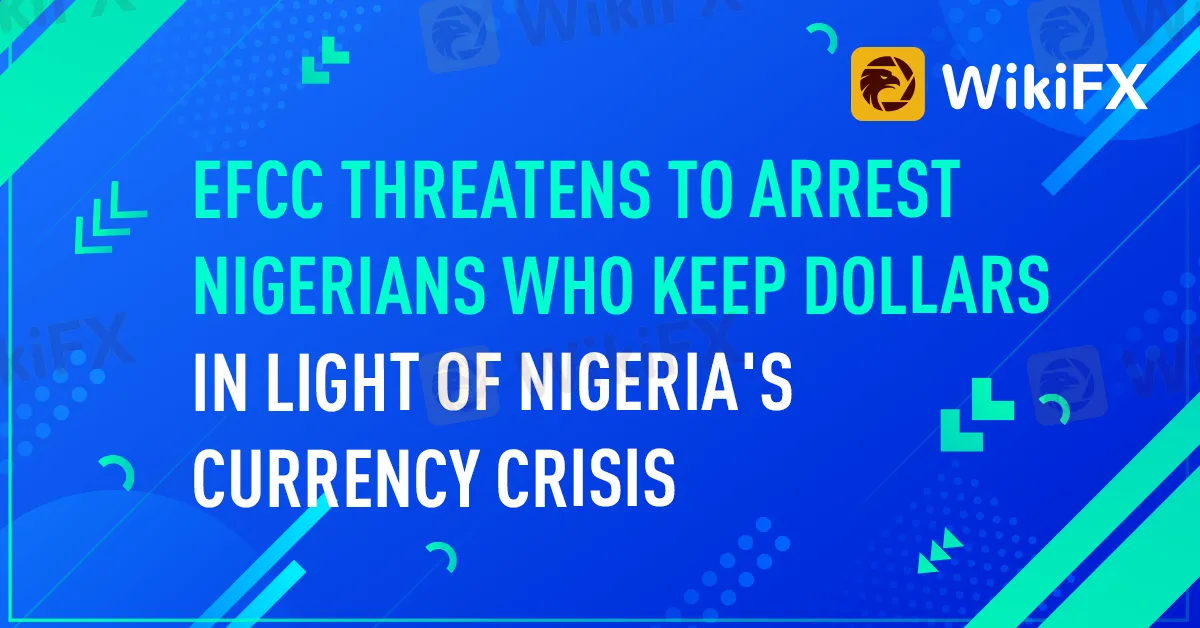简体中文
繁體中文
English
Pусский
日本語
ภาษาไทย
Tiếng Việt
Bahasa Indonesia
Español
हिन्दी
Filippiiniläinen
Français
Deutsch
Português
Türkçe
한국어
العربية
EFCC THREATENS TO ARREST NIGERIANS WHO KEEP DOLLARS IN LIGHT OF NIGERIA'S CURRENCY CRISIS
Abstract:Central Bank of Nigeria (CBN) stepped up attempts to avoid the naira from falling much lower by taking action to curb what it sees as acts weakening the nation's foreign exchange market.

The Central Bank of Nigeria (CBN) stepped up attempts to avoid the naira from falling much lower by taking action to curb what it sees as acts weakening the nation's foreign exchange market.
The CBN promised to take serious measures to control the recent drop of the naira to N710/$1, which it said was the result of market speculation. The Economic and Financial Crimes Commission (EFCC) has been brought into the fight by the apex bank, which has shifted its attention to the parallel market aand held Bureau de Change operators and members of the public accountable for the problem.
The naira appreciated to N680 per dollar in the black market on Saturday and held steady at N428 per dollar in the Investor and Export window as a result of the EFCC's raids on Bureau de Change businesses in Lagos and Abuja.
The anti-graft agency has issued a warning that it will jail anyone seen storing or stockpiling foreign currency.
The warning was given by the anti-graft agency's chairman, Abdulrasheed Bawa, on Friday in Abuja at a meeting with representatives of Bureau De Change operators. According to the intelligence the CIA has acquired, he claimed that Nigerians are hoarding foreign cash as the value of the naira drops.
“The Commission has information that some people and organizations are stockpiling foreign currency, particularly dollars, in important business hubs including Kano, Lagos, Port Harcourt, Enugu, and Calabar. A significant effort against the speculators is beginning, therefore we advise anyone participating to stop or risk being arrested,” he stated in a statement.
The CBN warned that it will punish banks, arrest, and prosecute Nigerians who use the naira to acquire dollars last month and blamed the depreciation of the naira on illegal FX activity.
Although much of the blame for the naira's troubles has been placed on BDCs, media, and the general people, the CBN has said that the Nigerian National Petroleum Corporation (NNPC) has been withholding payments to the nation's foreign reserve for months.
The argument is supported by experts' claims that the FX crisis is being exacerbated by a lack of dollar liquidity in the nation, despite the NNPC's denial of the claim. The NNPC is the only organization in the nation that exports and imports only petroleum goods. Over $2 billion, according to the NNPC, has been transferred into the account in recent months.
The EFCC is starting a rescue effort while the two agencies argue. The “save the naira” message, which will be sent to BDC operators countrywide, is already having a good impact, according to a statement released by the anti-graft agency following the meeting with parallel market stakeholders.
Similar meetings are also scheduled with important participants, regulators, and operators of the Nigerian financial sector, as well as other Bureau de Change operators in Nigeria's major commercial hubs.
However, as long as dollar-earning firms (export) in Nigeria continue to be as underdeveloped as they are, it is doubtful that the EFCC's participation would result in any appreciable change in the existing currency market.

Disclaimer:
The views in this article only represent the author's personal views, and do not constitute investment advice on this platform. This platform does not guarantee the accuracy, completeness and timeliness of the information in the article, and will not be liable for any loss caused by the use of or reliance on the information in the article.
Read more

Want to Succeed in Forex? Start with the Right Trading System
If you want to trade currencies and make money in the long run, you need a good forex trading system. Many new traders enter the market without a clear plan. Some rely on luck or tips from others. But trading without a system often leads to losses.

Risk Involved with Cabana Capital – Every Trader Should Know
Cabana Capital has changed its name and logo, basically everything about its identity. This seems a bit suspicious, and it's something you should definitely be concerned about. In this article, you’ll learn about the red flags that every trader needs to watch out for.

CME International Records a Massive Jump in Forex Volumes
CME International recorded a record surge in its foreign exchange trading volumes during the second quarter. Check out its performance across products and markets.

Scam Brokers Exposed! FCA Warns Traders to Stay Safe
If you are into forex trading, you need to protect your money from investment scams. Many scam brokers are active in the market now. The FCA, a reputed financial regulator, has issued a list of unlicensed brokers you need to stay away from.
WikiFX Broker
Latest News
US Government Interest Grows in Victory Metals’ Rare Earths Supply
How Are Trade Policies Affecting the Aluminum Market?
RM71,000 Lost in a Share Scheme That Never Existed
Scammed by a Click: He Lost RM300,000 in a Month
Manual vs. Automated Forex Trading: Which One Should You Choose?
Revealing Factors That Help Determine the Gold Price in India
Why Regulatory Compliance Is the Secret Ingredient to Trustworthy Forex Brokers
Pentagon to become largest shareholder in rare earth miner MP Materials; shares surge 40%
Delta shares jump 12% after airline reinstates 2025 profit outlook as CEO says bookings stabilized
Delta shares jump 13% after airline reinstates 2025 profit outlook as CEO says bookings stabilized
Currency Calculator


